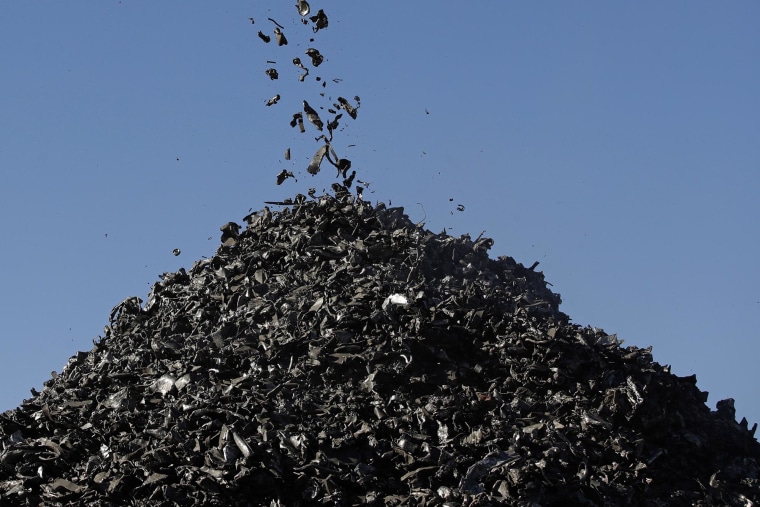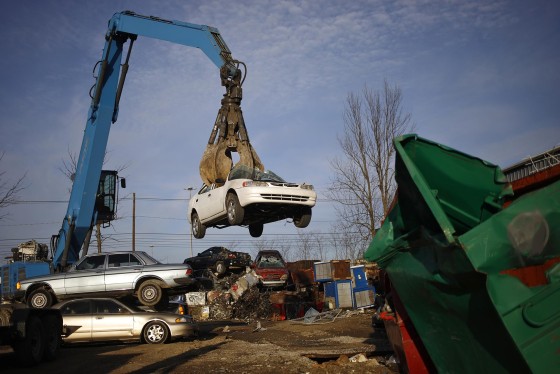Andrew Lincoln often visits schools to teach kids to reduce waste in their daily lives.
“It’s not anything new,” said Lincoln, who owns Lincoln Recycling in Erie, Pennsylvania. “We talk about the three Rs” — reduce, reuse, recycle.
But these days, telling the full story would require Lincoln to add a few more Rs, like “retaliatory tariffs” and “reliance on foreign imports.”
I don’t really like it when commodity prices are increasing greatly.
Andrew Lincoln, Owner of Lincoln Recycling, Erie, PA.
President Donald Trump’s 25% tariffs on steel and aluminum took effect on March 12, triggering a wave of countermeasures from foreign governments. The temporary carveouts he granted Canada and Mexico for those metals and other products are set to expire Wednesday — when Trump is set to unveil a vast new slate of tariffs on “all countries,” including “reciprocal” levies equalizing trade barriers around the world.
The European Commission said Tuesday that it’s preparing to reintroduce the retaliatory duties it had imposed during Trump’s first term, as part of a broader series of levies on American products teed up for mid-April. Canada has already slapped 25% tariffs on various U.S. goods, including steel and aluminum.
Tariffs can give domestic business a short-term boost, economists say, but it gets more complicated once other countries retaliate — making it tough to game out the ultimate winners and losers in an ever-evolving global trade war.
For recyclers like Lincoln, levies on foreign metal imports should juice demand for domestic ones, potentially benefiting his business at least in the short term. But Lincoln isn’t celebrating yet, citing the broader uncertainty unleashed by the White House’s tariff agenda and the blowback it’s drawn.
“We always like little movements up and down. I don’t really like it when commodity prices are increasing greatly,” Lincoln said. “There’s a backside of that: It can quickly fall.”

Other industry stakeholders are sounding similarly circumspect on the eve of what Trump has dubbed “Liberation Day” on Wednesday. The Aluminum Association, for example, supports some but not all of the president’s duties on the key metal.
“Increasing recycling by a few percentage points can drastically reduce our reliance on primary aluminum from foreign sources,” said Charles Johnson, CEO of the trade group, but he noted exports are crucial for the industry, too.
About 20% of recycled steel and 37% of recycled aluminum are sold abroad, according to the Recycled Materials Association, or ReMA. That totaled about $26.7 billion in exports in 2023, the organization estimates, sales that foreign governments’ retaliatory tariffs could choke off.
In 2018, Trump’s steel and aluminum tariffs excluded scrap metal, but ReMA said it hasn’t been able to determine whether that will hold true this time around, including under his blanket duties on Mexico and Canada.
Industry groups have voiced particular dismay that Trump picked a fight with Canada, a major U.S. supplier of both steel and aluminum. The country accounted for over 50% of aluminum imports and over 20% of steel and iron imports as of 2023, according to the U.S. Geological Survey.
Given these interdependencies, ReMA says it’s crucial that the $11 billion worth of recycled materials continues to trade freely within North America.
Our materials move to where there’s the most demand for them.
Adam Shaffer, recycled materials association
“Our materials move to where there’s the most demand for them,” said Adam Shaffer, vice president of international trade and global affairs at ReMA.
While the Aluminum Association has long supported curbing low-cost Chinese imports of “unfairly traded aluminum,” it opposes tariffs on Canadian aluminum. Johnson said he was optimistic that Trump would consider certain exemptions, as he did in 2018. That would help the domestic industry continue to “secure a reliable supply of primary metals for U.S. producers,” Johnson said.
The United Steelworkers has asked the administration to avoid unnecessarily antagonizing one the industry’s biggest trade partners.
“While our union absolutely views tariffs as one of many important tools we need to employ to rebalance our trade relationships, we urge a measured approach that both strengthens our manufacturing sector and accounts for our relationships with our allies, like Canada, who play by the rules,” the labor union said in a Feb. 10 statement.
Michael E. Hoffman, CEO of the National Waste and Recycling Association, which represents mostly consumer goods recyclers, likewise said it’s common for recycled materials to move relatively freely between Mexico, Canada and the U.S.
“It’s a North American model,” he said.
A White House spokesperson didn’t respond to a request for comment.
Even if tariffs succeed in making domestic steel and aluminum — both newly made and recycled supplies — more competitive with foreign counterparts, global retaliation threatens to destabilize commodity markets for these products. Higher prices at home are only good for American businesses if there’s enough demand to support them, Shaffer pointed out.
“It would be harmful for both the recyclers [and] also for the environment if there’s no market for these materials domestically,” he said.
Some Trump administration officials have said their sweeping trade policy changes could cause some short-term pain on the way to reinvigorating American industry. But even within sectors the White House is looking to bolster, there’s skepticism that the gamble will pay off.
“Some things make sense to be made overseas versus here,” Lincoln, the Pennsylvania recycling plant owner, said of aluminum production. “I don’t see the infrastructure coming immediately.”
